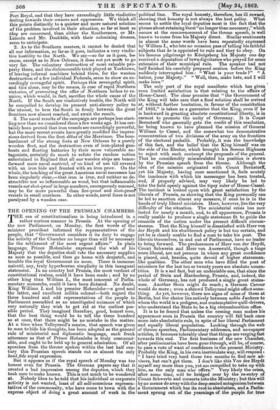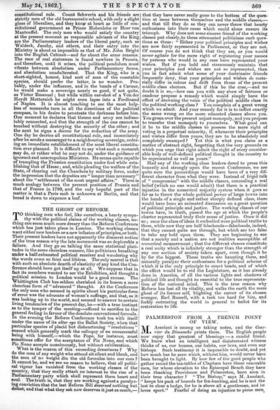THE OPENING- OF THE PRUSSIAN CHAMBERS. T HE era of constitutionalism
is being introduced in a rather curious manner in Prussia. At the opening of the new Parliament, on Monday, the first words of the minister president informed the representatives of the people, that "Government considers it its duty to engage the activity of the Chamber no longer than will be necessary for the settlement of the most urgent affairs." In plain language, Prince Hohenlohe expressed the wish of his Majesty that the deputies shall vote the necessary supplies as soon as possible, and then go home with despatch, and trouble the royal Government no more. There is immense nalvet6, nay, truly hyperborean simplicity in this inaugural statement. In no country but Prussia, the most verdant of constitutional realms, could it have been made • and by no other king than William I., the most innocent of Parlia- mentary monarchs, could it have been dictated. No doubt, King William L and his premier Hohenlohe—a good soul the latter, and excellent militia colonel—both regard the three hundred and odd representatives of the people in Parliament assembled as an unmitigated nuisance of which very naturally they wish to get rid at the earliest pos- sible period. They imagined therefore, good, honest men, that the best thing would be to tell the three hundred so at once, that there might be no mistake in the matter. At a time when Talleyrand's maxim, that speech was given to man to hide his thoughts, has been adopted as the general rule of ministerial and diplomatic language such frank utterance as that of Prince Hohenlohe is truly commend- able, and ought to be held up to general admiration. Of all speeches from the throne spoken within the last half cen- tury this Prussian speech stands out as almost the only bond fide royal expression. But it appears as if the royal speech of Monday was too honest even for Prussia. The German papers say that it created a bad impression among the deputies, which they took care to make known. This is not much to be wondered at. Nobody likes to be told that his individual or corporate activity is not wanted, least of all self-conscious represen- tatives of the commonalty, who have come to town with the express object of doing a great amount of work in the political line. The royal honesty, therefore, has ill reward, showing that honesty is not always the best policy. What seems to nettle the loyal deputies most is the fact that the phrase about retaining theni" no longer than necessary," which occurs at the commencement of the throne speech, is well known to come from his Majesty direct. Similar sentiments in almost the same words have been repeatedly expressed by William I.' who lets no occasion pass of telling his faithful subjects that he is appointed to rule and they to obey. On his famous pilgrimage to Konigsberg his Majesty one day received a deputation of town dignitaries who prayed for some extension of their municipal rule. The speaker had not half finished his carefully prepared oration before the King suddenly interrupted him: "What is your trade ?" A hatter, your Majesty." "Well, then, make hats, and I will make laws." .
The only part of the royal manifesto which has given even limited satisfaction is that relating to the affairs of Hesse-Cassel. The clear promise that "the Government of the King will take care that a final solution shall be arrived at, without further hesitation, in favour of the constitution of 1831," is taken as a guarantee that the King, even if he is backward in granting absolute constitutional liberty, is in earnest to promote the unity of Germany. It is Count Bernstorff who generally gets the credit of this resolution, he being known to have planned the mission of General Willisen to Cassel, and the somewhat too demonstrative concentration of two divisions of the army on the frontiers of the electoral pashalik. Probably, it was the knowledge of this fact, and the belief that the King himself was on the side of the Elector, which brought his Serene Highness to reject with such contempt the proposals of the general. That he considerably miscalculated his position is shown by the Prussian speech from the throne. Although the idea of the mission originated with Count Bernstorff, yet his Majesty, having once sanctioned it, feels acutely the insolence with which his messenger has been treated, and, if properly advised, may very likely be led to take the field openly against the tipsy ruler of Hesse-Cassel. The incident is looked upon with great satisfaction by the liberals of Prussia, as showing that the King personally can be led to sanction almost any measure, if once he is in the hands of truly liberal ministers. Here, however, lies the very difficulty of the situation. The ministerial crisis has now lasted for nearly a month, and, to all appearance, Prussia is really unable to produce a single statesman fit to guide the councils of the nation under the present difficult circum- stances. That the King himself is dissatisfied with Herr von der Heydt and his shuttlecock policy is but too certain, and yet he is clearly unable to find a man to take his post. The liberals themselves, in and out of Parliament, have no leader to bring forward. The predecessors of Herr von der Heydt, Count Schwerin and Herr von Auerswald, though a tinge more liberal, are not persons in whom any great confidence is placed, and, besides, quite devoid of higher statesman- like qualities. The other men who have filled the post of ministers for the last ten or twenty years are absolute-nonen- tities. It is a sad fact, but an undeniable one, that since the period of Stein and Hardenberg, Prussia, and, indeed, the whole of Germany, has not produced a single great states- man. Another Stein might do much; a German Cavonr would do more; even a shrewd Talleyrand might effect some- thing. As yet, however, there are signs of none of these at Berlin, but the choice lies entirely between noble Junkers to whom the world is a pedigree, and contemplative quill. drivers, who understand the State to be a big circumlocution office. It is to be feared that unless the coming man makes his appearance soon in Prussia the country will fall back once more into absolutistic rule, in spite of her liberal Parliament and equally liberal population. Looking through the web of throne speeches, Parliamentary addresses, and newspaper articles, it becomes tolerably clear that things are verging fast towards this end. The first business of the new Chamber, after preliminaries have been gone through, will be, of course, to pass a vote of want of confidence in the present Miniktiy. Probably the King, in his own inarticulate way, will respond: "I have tried very hard these two months to find new ad- visers but can't get them. I don't like this Von der Heydt myself any more than you, yet am compelled to take up with him, as the only man who offers." Very likely the crisis, after some time, will be bridged over by the re-entry of Count Schwerin and consorts into the Ministry; but this will by no means do away with the deep-seated antagonism between. a Government which has its root in absolutism, and a Parlia- ment sprung out of the yearnings of the people for true constitutional rule. Count Schwerin and his friends are strictly men of the old bureaucratic school, with only a slight gloss of liberalism, and they know at heart as little of con- stitutional government as Prince Hohenlohe or Herr von Manteuffel. The only men who would satisfy the country at the present moment as responsible advisers of the King are the Parliamentary leaders of the liberal party, such as Waldeck, Jacoby, and others, and their entry into the Ministry is about as impossible as that of Mr. John Bright into the English Cabinet—and for about the same reasons. The race of real statesmen is found nowhere in Prussia, and therefore, until it arises, the political pendulum must vibrate between absolutism under Parliamentary forms, and absolutism unadulterated. That the King, who is a short-sighted, honest, kind sort of man of the constable species, should prefer the latter, is no wonder. Pro- bably, under the influence, and in the hands of a Cavour, he would make a sovereign nearly as good,. if not quite, as Victor Emanuel ; but while within ear-shot of a Von der Heydt Metternich he might even lapse into a Ferdinand of Naples. It is almost touching to see the most help- less of monarchs turn in all the directions of the political compass, in his desire to penetrate the darkness before him. One moment he declares that throne and army are indisso- lubly connected, and that the strength of the one cannot be touched without destroying the security of the other ; and the next he signs a decree for the reduction of the army. One day he decries all constitutional rule, and immediately after he sends a messenger to a neighbouring sovereign, order- ing an immediate establishment of the most liberal constitu- tion ever planned. It is difficult to say what such a monarch may do, or rather what he may not do, under the guidance of ignorant and unscrupulous Ministers. He seems quite capable of trampling the Prussian constitution under foot while esta- blishing that of Hesse; and, while pleading the welfare of the State, of clearing out the Chambers by military force, under the impression that the deputies are "longer than necessary" about the "settlement of the most urgent affairs." There is much analogy between the present position of Prussia and that of France in 1789, and the only hopeful part of the matter is that a Paris mob is unknown at Berlin, and that bread is down to sixpence a loaf.































 Previous page
Previous page